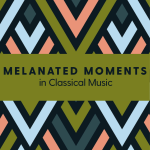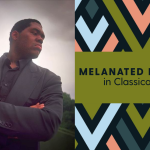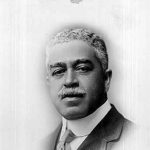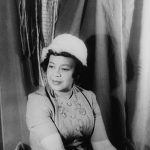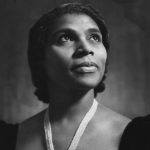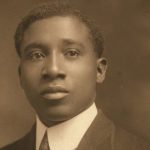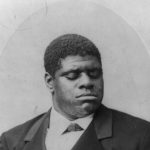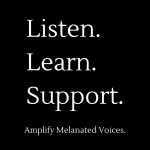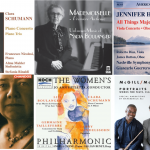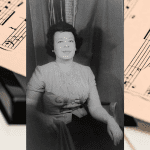MMCM S3E3: Masterful Movements for THE Movement – Margaret Bonds
Joshua and Angela acquaint us with a groundbreaking composer and pianist, Margaret Bonds. Joshua takes us through the life of Margaret Bonds, who was at the epicenter of cultural and artistic expression during the turn of the 20th century, collaborating with luminaries Florence Price and Langston Hughes, among others. We hear a performance of Bonds’ Montgomery Variations, performed by the University of Connecticut Symphony Orchestra, a stunning example of the composer’s ability to “score” the civil rights movement.
Featured music:
“Montgomery Variations,” by Margaret Bonds, performed by the University of Connecticut Symphony Orchestra
Joshua Thompson (00:00): Before we get started with this episode, we wanted to thank everyone for your amazing support of this podcast. As our podcast community grows, we have added resources for each episode. So just visit our website to access blog posts and transcripts for each episode or follow us on social media and email us anytime with your podcast suggestions to melanatedmoments@classicalmusicindy.org. Music Plays (00:34): [MMCM theme] Joshua Thompson (00:43): Hey y’all and welcome back to Melanated Moments in Classical Music. I’m your co-host Joshua Thompson… Angela Brown (00:50): And I’m Angela Brown season three has been chock full of inspiration, information, community and compositions. Mr. Joshua, who are we discussing today that embodies all of those things? Joshua Thompson (01:04): Angela, today I am so geeked to highlight the brilliant life of one of my favorite composers, Margaret Bonds! Angela Brown (01:13): Yes! Fantastic! She’s one of my favorites too and has a life story that is nothing short of spellbinding. Joshua Thompson (01:20): I agree. Margaret Bonds is one of those people whose story is a little difficult for me to present in a succinct manner because it’s just so packed with everything. Angela Brown (01:32): How do you mean? Joshua Thompson (01:34): Well, I mean– first off, she was a killer pianist and inspired composer, and she used both of these skills towards a broader and– in my humble opinion– a more important purpose in social justice, community building, and arts advocacy for artists in general, but young black artists specifically. Angela Brown (01:57): Like an onion, there’s layers to this woman. Joshua Thompson (02:00): Layers and levels, honey, layers and levels! We have a lot to cover today, musically and biographically. So let me just jump right on in! Angela Brown (02:11): Alright honey, go on jump. Let’s get to it. Let’s get to it! Joshua Thompson (02:13): Well, here we go. You know, before I get started, I want to take a moment to acknowledge and thank a fellow colleague and, like a friend in cyberspace, Dr. Michael Cooper, who is a very well-known musicologist and civil rights advocate. This man has dedicated his entire life to, as his website says, “helping to make unheard music part of our world”, and much of his work centers around the life and times of Margaret Bonds and Florence Price. Angela Brown (02:42): Well, isn’t that wonderful? Thank you, Dr. Cooper! Joshua Thompson (02:42): [laughter] You know, uh, the way I came to meet Dr. Cooper is, uh, if you all remember, we had a lot of time on our hands during the peak of the pandemic, right? Angela Brown (02:56): Yeah, we did. Joshua Thompson (02:57): And so, during that time, um, I joined quite a few black composers and black musicians’ groups, um, that are online. And he’s just one of the many, many awesome people around the world that I’ve had the pleasure of meeting, engaging with, and sharing what we all know about this awesome subject matter. Angela Brown (03:17): Well, that is wonderful to see all you guys just in there, chopping it up together. There is some positive use of social media out there after all. Well, thank you, Dr. Cooper for being of service to the industry once again. I take it, you’ll make sure we add his information and website link to this episode’s transcript. Joshua Thompson (03:38): But of course, cause all that brilliance, ain’t doing nobody any good, just kept between you and me. So back to the lady of the hour, Margaret Bonds. Margaret Bonds was born March 3rd, 1913, and died April 26th, 1972. She was an American composer, pianist, arranger, teacher, community builder, and social justice warrior. She’s one of the first black composers to gain recognition in the United States, in large part [due] to her 1933 performance with the Chicago Symphony Orchestra as the first Black person in history to do so! Her mother was a gifted musician and educator, and Bonds grew up in the segregated part of Chicago to a home that was visited by some of the most leading writers, artists, and musicians of the era, including Florence Price. So, it’s undeniable that Bonds’ upbringing in intellectual and activist circles, um, definitely found their way into her music. She was composing by the age of five, and she studied piano and composition with Florence Price, and also with William Dawson. In high school…she’s studying with these folks! So, at 16, Margaret bonds begins her studies at Northwestern University, earning a bachelor’s and a Master’s of Music by 1934. Now we know the time period that we’re in. And so, for her, the university setting was unbelievably hostile and her experience there had a very profound impact on her life and her future writing. She opens the Allied Arts Academy in 1936 and taught art, music, and ballet– of all things, uh, to– you know, the residents and the children in the Chicagoland area. She moves to New York City, um, after Northwestern, and she attends Juilliard School of Music, lives in Harlem, where she meets and becomes creative partners with Langston Hughes and several other prominent figures, uh, from the Harlem Renaissance. If you want to read those letters, hit up Dr. Cooper because he’s got tons and tons of transcripts and letters that these two actually wrote back and forth together. As people and as friends and they’re really sweet. They are really really sweet– Angela Brown (06:02): Yea! And, you know, she and Florence Price actually were roommates at one time. Joshua Thompson (06:09): That’s– Angela Brown (06:10): Isn’t that something? Joshua Thompson (06:10): — Again. So, the smaller the world gets… Right? Um, and so then later on Margaret Bonds goes to form the Chamber of Society, which is a group made of Black musicians who were primarily performing works by Black composers and then goes on to establish the Cultural Community Center of Harlem. Um, and then spends the last part of her life in Los Angeles. Uh, she moves out there in 1968 and, um, in 1972, she does pass away unexpectedly. So that’s kind of a quick rundown on Margaret Bonds. Angela Brown (06:44): You know how they say ‘ain’t nothing new under the sun? And this is just another example of it, what you and I are doing– what so many others around the world are doing, to elevate the compositions and musicians of African descent and classical music is truly powerful, very powerful. Joshua Thompson (07:05): It really is. And I say this with all sincerity: it’s incredibly humbling. Uh, what strikes me is how the life and work of Margaret Bonds brings together the history of contemporaries that were living at the time and the things that were going on. Because a lot of times we seem to think that this stuff happens in a vacuum, separate from one another. Angela Brown (07:27): Okay, but before you lose me, honey, break that down a little bit more for us please. Joshua Thompson (07:34): Oh, of course. So globally, she’s born just before World War I, right? So that’s the time/place in which we’re in. And think about what’s going on between different countries and people. She’s also pioneering an artistic and academic industry that, quite frankly, does not want her there. Um, and that’s– Right? — And that’s evidenced by, you know, Jim Crow, segregation of the 1930s and 40s, but she’s also the nucleus for the Harlem Renaissance. She’s also championing women’s rights in addition to, like, literally scoring the Civil Rights Movement, and she’s a giant gift from the universe and there’s no way around that. Angela Brown (08:16): So much history going on. You mentioned that her work pretty much scores the Civil Rights Era. Is that a common thread with all of her works? Joshua Thompson (08:26): You know, yeah. For the most part, it is. We always seem to think that the Civil Rights Era starts in the fifties and that’s not true. It’s a continuation on, right? Angela Brown (08:37): Oh yeah. Joshua Thompson (08:38): So, I’ll give you an example, uh, that’s outside of her numerous collaborations with Langston Hughes because those are well, you know, worth exploring, but I wanted to select a piece today that truly has her standing on her own. For that, we’re gonna to turn to her 1964 epic tone poem, Montgomery Variations. It’s a set of seven programmatic variations on the spiritual, “I want Jesus to walk with me” or “Walk with Me, Lord”. And, uh, Margaret Bonds really constructs this set of variations on a single melody, very much like Bach did with his set of partitas. Angela Brown (09:18): And was that intentional? Joshua Thompson (09:20): Absolutely, absolutely. She’s doing what others have already done, which is centering spirituals using the classical tradition to reach a broader audience. To keep this stirring melody from getting a little stale, she identifies pivotal moments in the Civil Rights Era of the fifties and sixties. Um, so starting with the Montgomery Bus Boycotts, the 1963 bombing of the 16th Street Church, uh, 16th Street Baptist Church in Birmingham, Alabama, where if you recall, um, that’s where four little girls were killed. Angela Brown (09:53): Of course. Joshua Thompson (09:54): And over 20 people were injured during that time. We don’t have time to listen to all seven movements, but let’s start with the first one and it’s called “Decision.” And what this does is it sets to music, the point of activation Black people all over Montgomery, Alabama responded to under the leadership of Dr. Martin Luther King, Jr. and under the SCLC to boycott the bus company rather than remain segregated. Music Plays (10:30): [Montgomery Variations, No.1 “Decisions”- Margaret Bonds] Angela Brown (12:03): Joshua, what an opening statement! And yes, a decision indeed! And guiding that decision– it’s that spiritual. It’s been used, sampled, and arranged by William Grant Still, if I’m not mistaken? Joshua Thompson (12:18): No mistake at all. No mistake at all! That’s what is so great about spirituals. They were made to be arranged and repackaged, provided it’s done in sincerity and in communion with the creator who inspired them. Angela Brown (12:34): I want to hear one more! Joshua Thompson (12:36): Okay, well next we’ll move through the Civil Rights Movement. And this masterpiece with the third movement, “March”, is symbolic of the personal and collective marches made for months by blacks who would rather walk to work than remain segregated on the bus. Music Plays (13:21): [Montgomery Variations, No.3 “March”- Margaret Bonds]. Angela Brown (15:11): This is so moving and all the while, she is and has been composing for the advancement of her people through art, song, choral works, community campaigns, and social activism. We should all remain so committed to a life’s work that is bigger than ourselves. Joshua Thompson (15:29): I really couldn’t agree with you more. Let’s wrap this piece up a bit with movements Four and Five, perhaps the most visceral and poignant movements of the entire work. The Fourth Movement is entitled “One Sunday, in the South” and the Fifth Movement is “Lament”. The movements are a little heavy, but as we all know, there is beauty and mastery in sadness. So this one is based on the, on the Birmingham, Alabama church bombing I was telling you about, um, and “One Sunday, in the South”, it starts out like, you know, any old, regular Sunday morning when you’re going to Sunday school or children’s church, as we used to call it when I was growing up. And so all is well. And that’s what you’ll hear. All the hearts and souls are ready to receive the divine teachings of the creator before 19 sticks of dynamite are ignited and explode, killing four and injuring dozens. So that “Lament” comes right in as this universal salve of recognition, penance, and mourning. And it really is just so beautiful. Music Plays (16:40): [Montgomery Variations, No.4 “One Sunday, in the South”- Margaret Bonds] Music Plays (19:53): [Montgomery Variations, No.5 “Lament”- Margaret Bonds] Angela Brown (22:39): Honey, this whole episode just– just took them to a place where all my edges are snatched up, goodness! There is so much empowerment, beauty, and strength in this woman and what she contributed [to] for all of us. Brava, Brava! Y’all start intentionally programming her works– choral, piano, symphonic, chamber works, all of it! Joshua Thompson (23:04): Amen. Amen. And give me another one, amen, Auntie Angela! [laughter] Thank you, Margaret Bonds for showing us how to literally compose social change. Until next time, I’m Joshua Thompson… Angela Brown (23:19): And I’m Angela Brown. In Unison (23:28 And this has been Melanated Moments in Classical Music. Angela Brown (23:33): Melanated Moments in Classical Music is a production of Classical Music Indy. Our producer is Ezra Bakker Trupiano. Season Three production assistants are Okara Imani and Samantha Hoyer. Our theme music was composed by Laura Karpman. Joshua Thompson (23:51): Season Three of Melanated Moments in Classical Music was made possible in part by Jim and Sarah Lootens. We thank them for their generous support. Angela Brown (24:01): As a fan of this award winning podcast, we need your help today to create future episodes. You can make Season Four a reality by texting “MMCM” to 202-858-1233. Your support includes exclusive content, playlists, and other perks to thank you for helping us share the stories of even more exceptional Black artists on the podcast. Our podcast partners are The Black Podcasting Awards and Morning Brown Incorporated. Joshua Thompson (24:37): And finally, if you’d like to join us in the celebration of the Black experience in the world of podcasting, check out our friends at The Black Podcasting Awards website.
[/su_tab] [su_tab title=”Related Blog Posts” disabled=”no” anchor=”” url=”” target=”blank” class=””]LOCAL CLASSICAL – MELANATED MOMENTS SEASON SIX
As we continue celebrating Black Music Month, this week’s playlist will feature music and artists discussed during the latest season of Melanated Moments in Classical Music. All of season six was recently released and featured vibrant discussions about artists such as Scott Joplin, Hazel Scott, Joseph Bologne, and Kenneth Overton, among others.
LOCAL CLASSICAL – BLACK MUSIC MONTH
In this week’s playlist, we celebrate Black Music Month which takes place in June. It was created by President Jimmy Carter in 1979 to honor and celebrate Black artists’ contributions to music. We’ll be honoring the late Herman Whitfield III, an Indianapolis native who was a gifted pianist and composer. We’ll also hear performances of artists who have been featured in season four of Classical Music Indy’s podcast, Melanated Moments in Classical Music.
LOCAL CLASSICAL – MELANATED MOMENTS
In this week’s Black History Month playlist, we bring you recordings by composers, performers, and artists who have been highlighted in our podcast, Melanated Moments in Classical Music. Melanated Moments is the ward-winning podcast from Classical Music Indy that shines a spotlight on musical works composed by, for, and about Black people.
LOCAL CLASSICAL – HOST OKARA IMANI
Hey, Starshine! This is Okara Imani, Media Production Fellow for Classical Music Indy, and your guide to The “I” in Classical Music. I’m here to highlight the cultural and social intersections of the classical art form, beyond the Classical Period and beyond the constructs of Euro-centric high society origins.
Ric’key Pageot: Inspiring a Moment to Learn, Acknowledge, and Respect
Ric’key Pageot: Inspiring a Mo …
Ignatius Sancho: Composing the Hypocrisy of Colonialism & Convention
Ignatius Sancho: Composing the …
NEW CLASSICAL – DR. BILL BANFIELD
This week we bring you the music of Dr. Bill Banfield. Dr. Banfield is an award-winning composer whose symphonies, operas, chamber works have been performed and recorded by major symphonies across the country. Few have a wider, performed professional composing output, that has had public concert performances, reviews, radio, recordings of some 12 symphonies, 7 opera, 9 concerti, chamber, jazz, and popular forms. This alone making Dr. Banfield one of the most performed, recorded composers of his generation. In 2010 and 2016, Dr. Banfield served as a Pulitzer Prize judge in American music.
#AmplifyMelanatedVoices
Classical Music Indy stands with our Black community. We are here to listen, learn, and lend our support. We believe that classical music is powerful; that it evokes a range of human emotions and creative expression.
Angela Brown Brings her Unbridled Zeal to a New Podcast.
Angela Brown brings her unbrid …
Local Classical – Angela Brown
We continue our Black History Month programming this week with our featured artist, soprano Angela Brown. Born in Indianapolis, Brown has led a world-renowned career as a vocal soloist. Her highly successful Metropolitan Opera debut in the title role of Aida captured instant attention from international print and broadcast media and catapulted Angela onto the world’s prestigious opera and symphonic stages.
Women Composers: CDs in our Music Library
The F. Bruce Peck Jr. Music Library at Classical Music Indy contains a wealth of classical recordings, many what you would expect – Beethoven, Bach, Brahms. We are also thrilled to house a number of albums that feature works by outstanding women composers like Clara Schumann, Nadia Boulanger, Valerie Coleman, and Jennifer Higdon. See what music is in our library and why we love it!
Margaret Bonds: A Unique Voice Crafted in the 20th Century
Margaret Allison Bonds is an often-unsung master of classical music. Her first-rate works blend styles of African and European origin, and her compositions for voice and piano have profoundly moved audiences. Bonds is best known for her collaborations with the great African American poet Langston Hughes. Read below about Bonds’ life, career, and musical contributions to the American classical music world.
Women In Music Playlist
Women’s History Month goes classical! We put together this playlist of dynamic women composers throughout classical music history, featuring the likes of Clara Schumann, Jennifer Higdon, Margaret Bonds, and more!
Highlighting our Female Performers
Classical Music Indy employs a diverse range of musicians for our events around Indianapolis. In 2016 we hired 95 musicians. Classical Music Indy has dedicated our blog articles to outstanding women musicians this month. We’ve shared about great women music educators in America and about under-recognized women musicians throughout history. This week, we take a look at a few of Classical Music Indy’s top performers – women who are doing great work here and now in the city of Indianapolis. Read below about these incredibly talented musicians, and hopefully you’ll hear them at one of our events in the near future!



